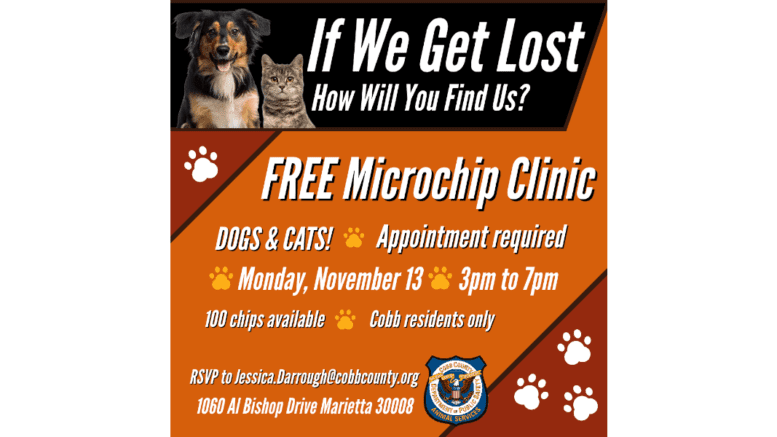by Inger Eberhart, Cobb County Department of Public Safety, Communications Specialist
If you’re planning to travel with your pet, microchipping is one of the most important things you can do to ensure their safety. A microchip is a tiny electronic device that is implanted under your pet’s skin. It contains a unique identification number that can be read by a scanner. If your pet gets lost or separated from you while traveling, a microchip can help them get back to you safely.
Why is microchipping important for travel?
There are a few reasons why microchipping is so important for travel. First, many countries require microchips for pets to enter. Second, if your pet gets lost or separated from you while traveling, a microchip can help them get back to you even if they don’t have their collar or tags on. Third, if your pet is stolen, a microchip can help law enforcement identify them and return them to you.
How does microchipping work?
A microchip is implanted under your pet’s skin between the shoulder blades. The procedure is quick and painless, and it doesn’t require anesthesia. Once the microchip is implanted, it will stay in place for the rest of your pet’s life.
If your pet gets lost or separated from you and is found by someone, they can take them to a veterinarian or animal shelter. The veterinarian or shelter will scan your pet for a microchip. If your pet is microchipped, the scanner will read the unique identification number and display your contact information. The veterinarian or shelter will then contact you to reunite you with your pet.
How to get your pet microchipped
You can get your pet microchipped at most veterinary clinics and animal shelters. The cost of microchipping varies, but it is typically relatively inexpensive. RSVP to Jessica.Darrough@cobbcounty.org to get your pet microchipped for FREE at Cobb County Animal Services’ Microchip Clinic.
Once your pet is microchipped, it is important to register the microchip with the manufacturer. This will ensure that your contact information is up-to-date and that you can be contacted if your pet is lost or found.
Tips for traveling with a microchipped pet
If you are traveling with a microchipped pet, there are a few things you can do to make the process easier:
- Make sure your pet’s microchip registration information is up-to-date.
- Bring a copy of your pet’s microchip registration information with you on your trip.
- Notify the microchip manufacturer that you will be traveling and provide them with your travel dates and contact information.
- Consider attaching a tag to your pet’s collar that includes your contact information and the microchip number.
By following these tips, you can help ensure that your pet has a safe and enjoyable trip.
Conclusion
Microchipping is a simple and effective way to protect your pet while traveling. If you are planning to travel with your pet, be sure to get them microchipped and registered with the manufacturer.
